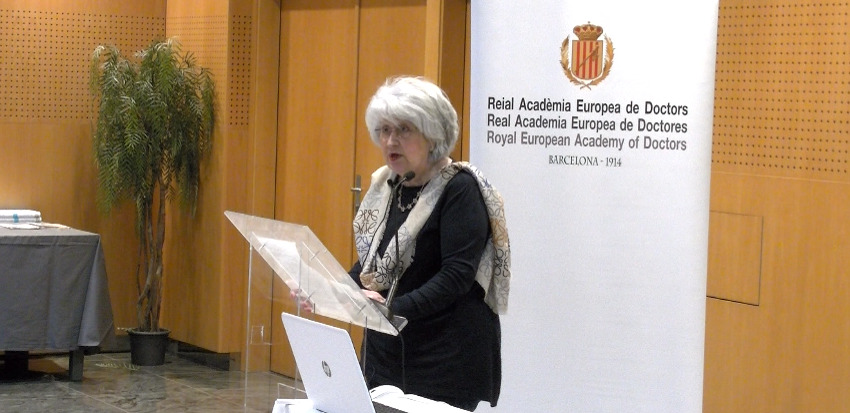Teresa Freixes
Professor at the Faculty of Law of the Autonomous University of Barcelona,
Full academician of the Royal European Academy of Doctors-Barcelona 1914 (RAED)
Article published in elCatalán.es
In these difficult days many of us look up at the European Union, because no country is oblivious to this health crisis that we are facing. Many wonder what the EU is doing when the virus crosses borders, endangers the health and life of citizens and also causes a major economic crisis. More coordinated action by the EU is lacking in this regard, but everything needs to be reported: the EU has pre-standards that it’s applying, has made important agreements to deal with various issues and is planning future policies so that the effects of the health crisis and its economic effects are as few as possible.
To start, it should be noted that Decision 1082/2013/EU of the European Parliament and of the European Council of 22 October 2013 on serious cross-border threats to health provides that:
“Article 168 of the Treaty on the Functioning of the European Union (TFEU) establishes, among other provisions, that, when defining and executing all the policies and actions of the Union, a high level of protection of human health must be guaranteed. This article also establishes that the Union’s action must complement national policies, cover the monitoring of serious cross-border threats to health, the alert in case of such threats and the fight against them, and that the Member States, in collaboration with the Commission, they must coordinate with each other their respective policies and programs in areas where the Union exercises public health action”.
In 1998, a network for epidemiological surveillance was created and, subsequently, an informal group called the Health Safety Committee, which complement Regulation (EC) No. 851/2004 of the European Parliament and of the European Council of April 21, 2004, creating a European Center for Disease Prevention and Control and the International Health Regulations (2005) (IHR), adopted on May 23, 2005 at the 58th World Health Assembly, reinforcing coordination preparedness and response to public health emergencies of international importance among the States that are part of the WHO, which include all the Member States of the Union.
Why is EU action important? Commission president Ursula Van der Leyen has stated that Member States aren’t alone in the face of this crisis: “Siamo tutti italiani”, she said at the height of the impact of the coronavirus in Italy. But this has to be specified in specific measures, since the Member States have the responsibility to manage public health crises at national level, the measures adopted by any of them could harm the interests of the others if they are inconsistent with each other or if they are based on divergent risk assessments. It’s therefore necessary to coordinate the response given at Union level, so that national measures are proportionate, specifically aimed at limiting public health risks from cross-border threats and taking into account the European framework for the movement restrictions and the rights and obligations derived from the economic objectives of the EU.
What specific measures are foreseen in the aforementioned Decision 1082/2013/EU? I will highlight the most significant:
-Joint acquisition of medical products for health response without being reflected in the budgets of the Member States.
-Coordinated exchange of information between Member States and the European Commission. In the event of urgent urgency, the Commission may adopt direct enforcement measures.
-The Food Safety Committee and the Commission will coordinate national responses. An emergency situation may be declared, in cases of flu or pandemics and, by informing the WHO, make immediately executive decisions.
The procedures and controls are available on the EU standards website: https://ec.europa.eu/health/sites/health/files/preparedness_response/docs/decision_serious_crossborder_threats_22102013_en.pdf
To face this specific crisis, caused by the pandemic caused by Covid-19, recognized by the WHO, the Commission, which is the EU body in which the legislative initiative resides, has prepared a proposal for a Regulation, reforming the previous regulations and mobilizing funds to face this emergency situation.
Likewise, the Commission has planned a fund of 37,000 million euros, with the Communication called “Coronavirus Response Investment Initiative” (CRII), to meet the medical expenses that may occur in the Member States. The Eurogroup meeting scheduled for Monday March 16 is expected to complete these forecasts.
Work is also being done with the Member States on the reorganization of air transport and evaluating the impact that all this may have on the tourism industry in order to adopt the appropriate measures at European level.
And the Commission will also speed up the preparation of a legislative proposal for a European unemployment reinsurance plan. This initiative aims to support those who work and protect those who have lost their jobs in the event of major shocks, as well as to reduce pressure on national public finances, thereby strengthening Europe’s social dimension and increasing its cohesion.
Lastly, I will point out the problem of border control, restricting free movement, in emergency situations, as provided for in Regulation (EU) 2016/399 (https://eur-lex.europa.eu/legal-content/ES/TXT/HTML/?uri=CELEX:32016R0399&from=ES#d1e1712-1-1) establishing the Schengen Borders Code, authorizing checks at internal borders for a maximum of 30 days, extendable for another 30 days that the circumstance that originated the restriction decision disappear, in cases that require immediate action.

Dra. Teresa Freixes




